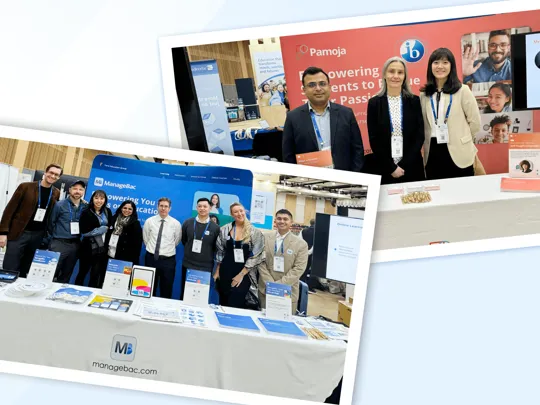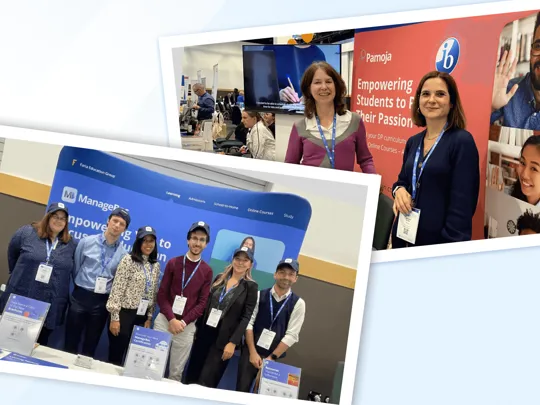The IB Global Conference, hosted in Toronto from 27 to 30 July 2023, welcomed ManageBac as a Global Sponsor with a shared dedication to enriching educational experiences for educators, students, and parents across the globe.
A key focus for Faria Education Group and ManageBac is understanding and solving the challenges that educators encounter in managing curricula, lessons, assessments, and communication. To this end, our team was excited to share how ManageBac supports collaborative teaching and personalised instruction.
With a goal of nurturing student achievement through our integrated software ecosystem, Faria streamlines school processes, underscoring our commitment to advancing global education for conference attendees and our schools worldwide.
Elijah Kurien, a recent DP graduate from Father Michael McGivney Catholic Academy who successfully completed the Psychology SL Pamoja Online Course, also joined us at the Pamoja stand, giving educators an opportunity for an in-depth conversation about the student experience, and providing valuable first-hand insights.
Education for an inclusive future
The conference theme, ‘Education for an Inclusive Future’, guided discussions on our evolving field. With its diverse sessions and networking opportunities, the conference brought together 1,300 IB educators from 48 countries to explore ways of enriching the IB experience and nurturing students into well-rounded global citizens. The event focused on brainstorming fresh concepts, teaching methodologies and best practices.
Over 95 sessions, participants engaged with experts, shared experiences, and connected with colleagues and exhibitors worldwide. Keynote speakers like Dr. Vanessa Andreotti, Liz Kleinrock, and Michelle Zimmerman added to the rich experience.
Centred around a holistic agenda, the conference delved into key subjects such as:
- land acknowledgement
- the significance of treaty people
- the promotion of diversity and inclusion
- the principles of sustainable education
- the importance of anti-racism efforts
- the enduring delight that stems from lifelong learning
- recognising the transformative impact of artificial intelligence (AI) on education.
This multifaceted exploration exemplified the event’s dedication to forging a sustainable and technologically empowered future.
The IB’s approach to developments in Artificial Intelligence
Dr. Matthew Glanville, Head of Assessment and Practice for the IB, discussed the ethical and philosophical dimensions of AI, offering insights grounded in research and a forward-looking perspective towards the 2030 horizon.
In the context of student engagement with AI, powered by platforms like ChatGPT, transparency stands as a crucial principle. To ensure this is upheld, students must treat AI-generated texts as sources indicated by quotation marks, clarify their AI origin, and include details (including the prompt) in the bibliography. This approach, applicable to all AI-generated work, emphasises students’ clear sourcing and thinking. The new IB Academic Integrity Policy provides additional guidance in this regard.
Guiding good essay practice involves steps such as considering the question, researching approaches, discussing and referencing, and deciding arguments. It examines the suitability of AI text generators (e.g. ChatGPT) as a proxy for discussion or search tools, highlighting the importance of not relying on it for the thinking process.
Education is at a crossroads of change, focusing on two crucial aspects. First, reimagining how we assess students. As educators, we’re embracing opportunities to align tests with our educational values, emphasising skills like critical thinking, noticing biases, and moving beyond just collecting facts to tasks that allow students to show what they really know.
Second, considering how education might change to adapt to an AI-driven world. Students must be equipped with skills tailored to this era, such as managing AI-generated prompts. The focus is on grasping concepts deeply and thoughtful thinking, rather than extensive writing. If it is fed biased data, AI has its shortcomings, which holds true for all data sources.
Finally, we are empowering students who are good thinkers but may struggle with writing. This shift is all about reshaping education to fit a future in which learners are smart critical thinkers and ready for AI-driven challenges.
AI presents promising potential for ethics integration in classrooms, offering a dual advantage of reducing teacher workload and serving as a valuable teaching assistant, thus contributing to a more efficient and effective educational landscape.







